What Happens to Your Body If You Go for a Walk in Bad Air Quality
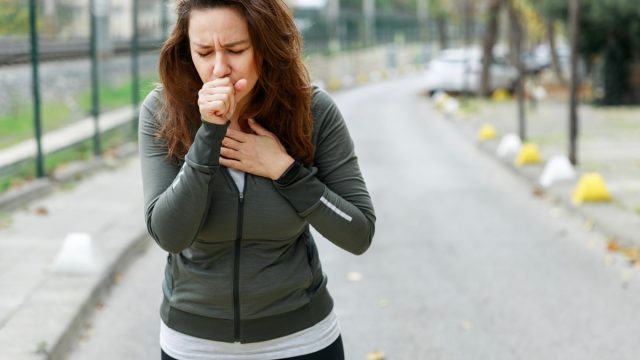
Many of us rely on a daily walk to keep our minds and bodies in shape. But with wildfire smoke from Canada blanketing much of the northern United States, is it still safe to get our steps in outdoors? While the pervasive smell of smoke may make your walk less pleasant than usual, being cooped up isn’t so fun, either—as we know all too well after living through the COVID-19 pandemic. According to the U.S. Environmental Protection Agency (EPA), there are many factors at play when evaluating whether or not you should spend time outdoors when the air quality is bad.
“The air pollution level, a person’s health status, and the length and intensity of the exercise are all important to consider,” their experts write, noting that there is no hard and fast answer to whether or not it’s safe to go for a walk outside in polluted air. That said, in New York City and other places affected by the Canadian wildfires, air pollution levels are extremely high, and classified as “very unhealthy.”
Go to Airnow.gov to check the current level of air pollution where you live, and the corresponding color-coded alert. If your city is in the red zone or worse, they recommend avoiding strenuous outdoor activities, keeping less-strenuous activities short, and moving physical activities inside or postponing them until the air clears. Note that people with heart or lung disease, elderly people, children, and adolescents are advised to avoid physical outdoor activities completely in this case.
If you’re determined to get outside—or if you absolutely have to brave the haze, as many of us do—read on to find out what you need to know about what can happen to your body if you take a walk when the air quality is bad.
READ THIS NEXT: The Most Walkable U.S. Cities in America for Seniors.
Your eyes and throat may feel irritated.
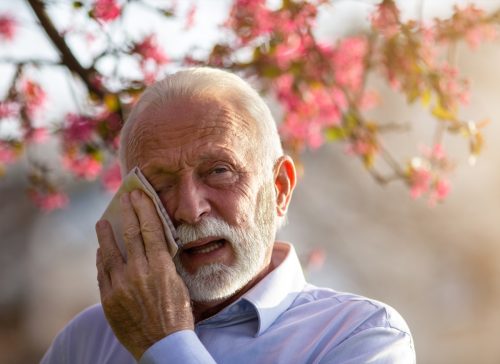
“It is best to avoid or limit time outdoors when the air quality is as poor as it is today, especially if you belong to a sensitive group,” researcher and air quality expert Jie Zhao, PhD, tells Best Life. “This includes individuals with respiratory issues such as asthma, allergies, chronic obstructive pulmonary disease (COPD); cardiovascular conditions; weakened immune systems; as well as older adults, pregnant women, and young children.”
If you do venture outside, he says the first thing that will likely happen is that you’ll feel the effects of the wildfire smoke in your eyes and throat. “In the short-term, if you’re a healthy adult, you may experience a sore throat and itchy eyes due to irritation. If you fall into one of the sensitive groups, you may experience coughing, wheezing, difficulty breathing, and in severe cases, serious heart problems.”
Your sinuses and lungs may suffer.
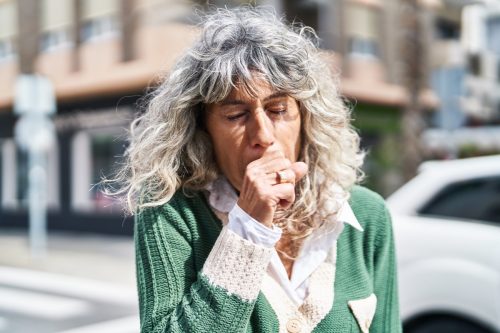
It’s not just your eyes and throat that are at risk if you decide to go for a stroll in seriously polluted air, explains Gail Lebovic, MD, the CEO of Silicon Valley Inventions. Most of us are breathing in irritants, germs, allergens, and potentially toxic substances every day—especially if we live in an urban community—but the added smoke from wildfires can really take it up a notch and have a greater effect on our lungs.
“The nose is the window to the lungs,” she says. “Exposure to wildfires and volatile organic compounds (VOCs) can wreak havoc on the delicate tissues of the nose, sinuses, and particularly the lungs.”
Lebovic says that in the short term, breathing in these airborne particles may manifest as allergies, asthma, and sinus problems. In the long term, “these irritants can cause serious lung conditions and, in some cases, even cancer.”
Your vital organs could also be damaged long term.
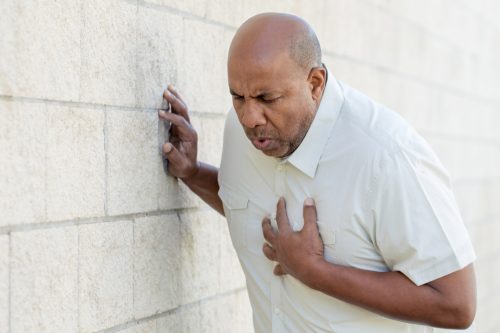
While the current smoke situation due to the Canadian wildfires will hopefully not last more than “another day or so,” according to CBS News, they report that experts say “we may see more events like this as the summer continues.” If air quality continues to be poor, that’s bad news for our bodies—and our daily walks.
“In the long-term, the fine particulate matter that you’ve breathed in from smoke may cause more damage, as it can stay in your lungs and even enter the bloodstream, eventually making its way to certain organs, such as the heart wall,” says Zhao, explaining that this is how pollution causes heart attacks. “The general rule is that the longer and more severe your exposure to polluted air, the more damage it can cause to your health in the long run.”
Lebovic says that breathing contaminated air means there is less oxygen available to our lungs, making it harder for our vital organs like the heart, brain, and kidneys to function. “Bad air quality is no joke,” she warns.
For more health news sent directly to your inbox, sign up for our daily newsletter.
Here’s how to take a walk safely when air quality is bad.
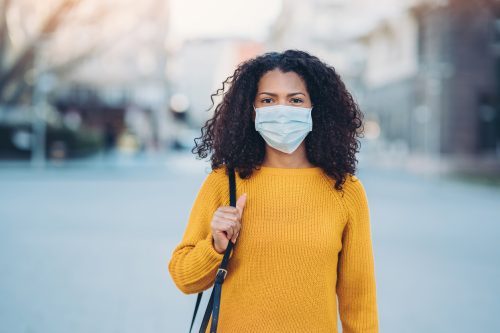
If you live in a place that’s affected by the wildfires, you may have noticed many people wearing masks outdoors, as they did during the pandemic. However, Zhao says that cloth masks and surgical masks are not especially effective. “A properly-fitted N95 is the only type of mask that can meaningfully reduce the amount of fine particulate matter (PM2.5) that you inhale,” he says. “It is also important to note that no mask will prevent irritation to your eyes.”
If you do decide to take a walk, it’s best to keep it short— and stick to walking during daytime. “Particulate concentrations are generally worse at night,” Michael Koehle, MD, PhD, and director of the Environmental Physiology Laboratory at the University of British Columbia, told The Washington Post. He explained that smoke settles closer to the ground as the day goes on, and doesn’t begin to lift until after sunrise the next day. So if you generally take your walks in the evening or at night, or prefer to get out early, before the sun rises, you might want to rethink your routine. “Pre-dawn levels are still high,” he said.
Best Life offers the most up-to-date information from top experts, new research, and health agencies, but our content is not meant to be a substitute for professional guidance. If you have health questions or concerns, always consult your healthcare provider directly.